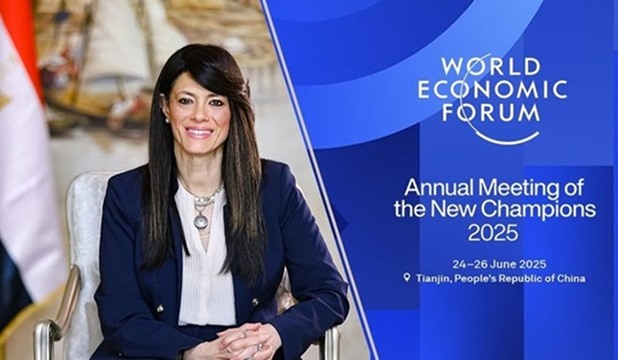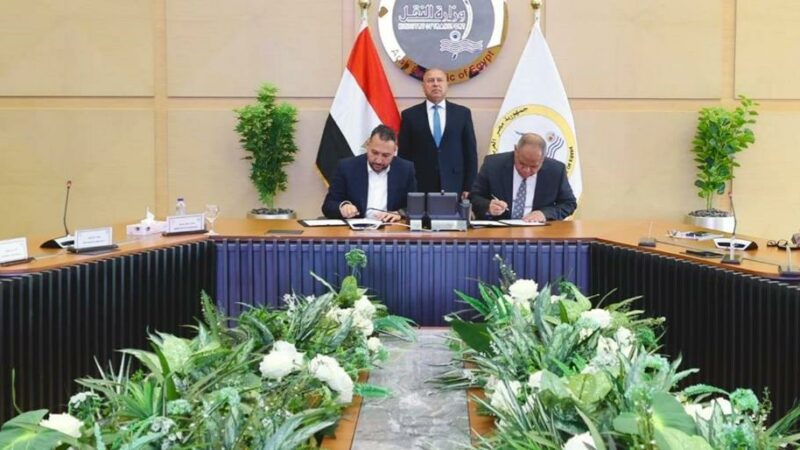EGYPT – Minister of Planning, Economic Development and International Cooperation Participates in High-Level Session on “Belt and Road Initiative” during World Economic Forum (WEF) Meetings in China

The event saw high-level participation from policymakers, private sector leaders, and entrepreneurs from over 90 countries
H.E. Dr. Rania A. Al-Mashat, Minister of Planning, Economic Development and International Cooperation, participated in the high-level discussion session titled “Where is the Belt and Road in 2025?” during her role as a co-chair of the World Economic Forum meetings, held from June 23-26, 2025, under the theme “Resilient Economic Policies to Keep Up with Global Change” in Tianjin, China.
The event saw high-level participation from policymakers, private sector leaders, and entrepreneurs from over 90 countries.
During her speech, H.E. Dr. Rania Al-Mashat pointed out that international partnerships are always built on shared and mutual interests, adding that the large number of countries participating in the Belt and Road Initiative reflects its importance. She noted the celebration last year of the 10th anniversary of the initiative’s launch, where participating countries showcased projects being implemented under the Belt and Road Initiative, which supported sustainable infrastructure in areas such as transport, renewable energy, and ports.
H.E. Dr. Al-Mashat added that each of these projects reflects the national priorities of the countries, and for Egypt, the projects were consistent with the national agenda and strategic goals of the state.
Regarding the stimulating factors contributing to accelerating the implementation of these projects, H.E. Dr. Al-Mashat outlined that the Belt and Road Initiative has been a real catalyst in many cases for advancing national strategies. She pointed to the emergence of a number of national and international initiatives that integrate with and support the Belt and Road Initiative in the recent period, noting that China launched the Global Development Initiative several years ago, and many projects implemented under that initiative run in parallel with and support Belt and Road projects.
H.E. Minister Al-Mashat also mentioned the issue of financing, explaining that much of the funding directed to these projects came through development finance. She highlighted that, with regard to sustainable transport and renewable energy projects in Egypt, there is a significant mobilization of resources towards the private sector, including low-cost development finance that has contributed to advancing investments.
Regarding relations between Egypt and China, H.E. Dr. Al-Mashat stated that the historic visit of the Chinese President to Egypt in 2014 was an important starting point in Egyptian-Chinese relations, followed by the signing of MoU on the Belt and Road Initiative. She noted that relations between the two countries are based on two main aspects: the first relates to investments, with Chinese companies investing in Egypt, and the second is development cooperation between the two governments.
Regarding development cooperation, H.E. Minister Al-Mashat indicated that it includes projects in multiple fields such as health, satellites, and capacity building, noting the role of the China International Development Cooperation Agency (CIDCA) in supporting Egypt’s development agenda, in addition to China signing a debt swap agreement several years ago. She added that Egyptian-Chinese relations are also based on investment and trade, pointing to a large number of Chinese companies within the China-Egypt Suez Economic and Trade Cooperation Zone in Egypt, where more than 150 companies operate, providing over 10,000 job opportunities, with diverse activities across multiple sectors.
H.E. Dr. Al-Mashat reiterated that the Belt and Road Initiative does not impose a specific plan on countries; it is not an initiative based on a centralized blueprint that obliges each country to a specific path or project. Instead, it is a flexible framework that adapts to the priorities of each individual country.
Regarding the issue of financing, H.E. Dr. Al-Mashat referred to the “4th Financing for Development” conference to be held in Seville on June 30, a UN conference held every ten years focusing on ways to finance development in developing and emerging economies. She explained that one of the most prominent messages of this conference is that the world needs to reduce reliance on debt and increase the mobilization of resources from the private sector to finance development projects.
H.E. Minister Al-Mashat added that each country has full ownership in designing its projects, in line with its national vision, to then include these projects within the broader framework of the Belt and Road Initiative. Furthermore, the cost of implementing these projects represents a common challenge and has been a strongly debated issue on the global stage for years, requiring innovative solutions and multiple sources of financing. She noted that, concerning debt, there are many international initiatives aimed at addressing this issue, including “debt-for-development and investment swaps” mechanisms.





